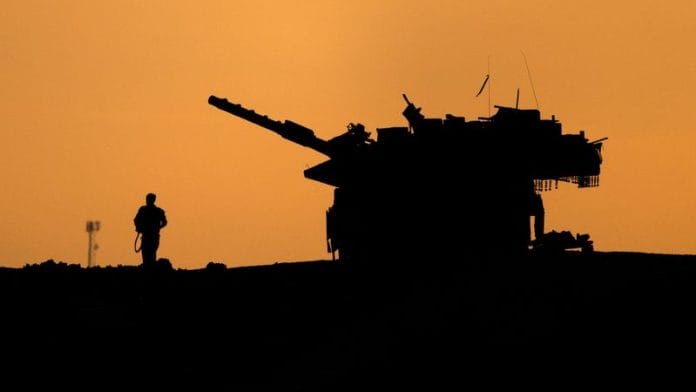The year 2024 leaves Israelis with mixed feelings about their state, security, and peoplehood. Israel decisively prevailed over external challenges this year, yet there is a sense of domestic letdown. A nation’s history is often shaped by pivotal events, actors, and ideas, and the present remains captive to those moments. The 7 October 2023 Hamas terror attacks on Israeli civilians was one of those seminal events that gripped the state and society for the past fifteen months, with consequences that will linger for years to come.
Israel walked into 2024 reeling from the shock of the attacks, spending several weeks counting the dead and abducted. More than a hundred hostages remain in captivity. As the year began, Israel was caught on two fronts—Hamas in the south and Hezbollah in the north. Iran was omnipresent with its overt support and arms to Houthis in Yemen and militant groups in the West Bank to not let Israel feel secure again. Militarily, Israel not only sustained and survived but also grabbed opportunities to attack Iran, assassinate Hamas leader Ismail Haniya in Tehran, conduct pager explosions all over Lebanese towns, and eventually assassinate Hasan Nasrallah.
Israel’s military strategies and intelligence depth caused the collapse of Hezbollah’s militant strongholds in Lebanon as well as Syria. As a result, Syria is now under a new regime independent of Iranian influence or Hezbollah’s dictates. Lebanon is rebuilding with American and French military and financial assistance to deter Iranian interventions.
At the start of 2024, Israel’s military and government were apprehensive and under severe domestic doubts, but by year-end, they seem self-assured and upbeat about handling military challenges in the Middle East. With strong Western allies, Israel stands secure and capable on the military front.
Also read: Human Rights Watch says Israel’s deprivation of water in Gaza is act of genocide
Action without accountability
The people of Israel are in a dilemma about military feats, the ‘crushing the enemy’ spirit, and the geostrategic advantages the government celebrates. A dissonance exists between the people and the government because the remaining hostages have not been a priority for the government. Their families are on the streets every day and hunger strikes have persisted outside parliament since September. Yet, the government is stable enough to carry on with its goal of ‘total victory’ and no concessions to Hamas. Such a hawkish and military policy leaves no room for compromise to rescue the hostages. Israelis hadn’t experienced this abandonment before, and this has created a rupture in the unity of its people, army, and state.
The year-long military successes and ‘defeating the enemy’ claims stand exposed when one visits the hostage squares all over the country, where people assemble to support the protesting families. At Israel’s international airport, photos of the hostages have lined the exit lobby for over a year. The long course of the war has caused fatigue among the protesters, and the large demonstrations have withered away. Losing hope but not the stamina to continue their fight, families have staged hunger strikes for the past three months.
As 2024 comes to an end, Israelis continue to be perplexed by the security failure, intelligence lacuna, and border unpreparedness on 7 October. Despite pressure from the public, the government hasn’t formed an independent commission to investigate the failure, and advanced legislation to prevent judicial inquiries that can hold Prime Minister Benjamin Netanyahu accountable. In the absence of a strong political opposition, Netanyahu’s government appears poised to serve its full term until 2026. To many ultranationalists and some strategists, his militant approach toward Hamas, Hezbollah, and Iran is praiseworthy and restored some of Israel’s lost mojo in the Middle East. The missile attacks from Yemen’s Houthis reinforce this hawkish approach, pushing public focus away from reflection and compromise.
Given the government’s stance, Israeli hostages may not return anytime soon. And yet, the government is not threatened in any way because Israelis stand divided on whether the state should negotiate or pursue “total victory.” As 2025 approaches, Israelis will be asked by the state to cope with security dilemmas, episodic war-like situations with Iran and the Houthis, and elusive victories that don’t bring their people home or end wars.
Khinvraj Jangid is Associate Professor and Director, Centre for Israel Studies, OP Jindal Global University, Sonipat. He is visiting faculty at Ben-Gurion University of the Negev, Israel. Views are personal.
(Edited by Prashant)







Israel has shown the world that it is indeed possible to deal effectively with Jihadi terrorists. It has single handedly fought on all fronts and demolished Hamas, Hezbollah and others.
The world must wake up and realise that Islamic fundamentalism poses a threat to the whole of humanity, not just Israel. Everyone needs to join hands in a global fight against Jihadi terrorism emanating from Islamic fanaticism.
Israel has set an example for the world on how to deal with Islamic Jihad. Evey single country dealing with violent Islamic fundamentalism must learn from Israel on how to effectively combat and counter this evil.
One cannot but admire and respect the Israelis – surrounded by enemies with hardly any natural resources and yet victorious every single time.